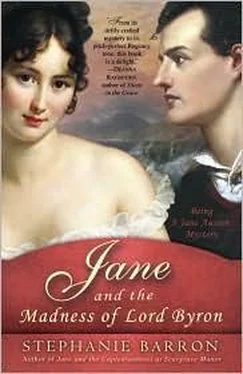Henry surged off through the crowd, his champagne glass held high; and as my eyes followed his course, I thought I glimpsed Desdemona, Countess of Swithin — in animated conversation with a lady I did not recognise. She looked cool as September in transparent gauze, and I swear her underskirt was dampened so as to cling to her skin — her form might almost have been etched in marble for every eye — but I credited her for the canny preparation borne of past experience: in the heat of the Marine Pavilion, one might as well arrive already drenched. I debated approaching her, but a tide of humanity, swelling and lapping about the tables of food, separated us; I must hope to meet with the Countess at a more propitious hour.
“Miss Austen, this is a pleasure indeed!”
I turned with difficulty — being caught in a crush between a lady with three ostrich plumes waving on her head, and a corpulent gentleman whose broad stomach, expensively clad in white satin breeches and embroidered waistcoat, permitted him no movement at all — and discovered a beaming Lord Moira before me.
I had come to know the Earl in London, where he formed one of Eliza’s court; and the mix of sympathy and delight in his notice at the present moment recalled her immediately to mind. I offered him my hand; he bowed over it and muttered some words regarding our dreadful loss — that no amount of time should reconcile us — that Heaven had acquired a hellion, or Hell its first real angel — and I found myself smiling back at him with a curious sensation of relief. The Marine Pavilion, and Brighton itself, could not be so awful when Lord Moira moved in their midst.
My brother enjoyed Lord Moira’s patronage at his bank; but the Earl had also been an intimate of Lord Harold Trowbridge, during a period of high intrigue among the Whig Party, at whose centre Lord Harold always had been; and from this cause of friendship alone must remain an object of my regard. [12] Francis Rawdon, then the second Earl Moira, had been appointed governor-general of Bengal in 1812, and left England later in 1813 without repaying the loans he had drawn on Henry Austen’s bank. — Editor’s note.
“And how do you do, my lord?” I enquired. “You are in excellent health, I hope? Does the sea air of Brighton agree with you?”
“Not at all, my pretty — not at all! I am never so bilious as when I am by the sea. But the Regent, you know, must have his household about him; and where His Royal Highness commands, I know my duty. I shall be playing whist for five-pound points until August at least, when the shooting season releases us all to the North. But enough of me! This is your first visit to Brighton, I collect? And have you been presented to the Regent?”
“Sir … I …” The words were stuttered in confusion. It was not enough that I was clad in dreary black, of which His Highness is said to have the greatest abhorrence; nor that I am well past my bloom, and could not excite admiration with the freshness of my looks; only add to all this, indeed, the profundity of my contempt for the man — who treats all women, particularly his wife, with a publick disrespect and callous conceit not to be borne — and you will understand the desperation of my desire to avoid the Regent’s notice.
But Lord Moira was already searching beyond my head for the Royal figure, so vast and magnificent, with its dyed locks carefully arranged à la Brutus; its fobs and seals and various puffery orders displayed upon its vast expanse of bosom; its elaborately tied cravat and its ponderous thighs. And as I observed Lord Moira’s countenance, it underwent a change; a suffusion of pleasure overcame the thickened cheeks.
“Mr. Austen!” the Earl cried. “My dear Henry! I have blockaded your sister here by the lobster patties, and must engage your support in overcoming her blushes! She protests she cannot meet the Regent! For shame! Why else is she come to the Marine Pavilion, indeed?”
“To gawk at all the ton in their summer pleasure ground, my lord. For you must know that Jane possesses as exquisite a taste as Beau Brummell — she holds the Regent in absolute abhorrence.”
The Earl’s expression of dismay was a visible reproach; poor Eliza should never have repaid his attentions so ill, and my conscience smote me. Henry’s shot at levity had fallen too wide of its mark. We were both of us in danger of offending an old friend, and one who had every reason to expect our gratitude, in having procured the evening’s tickets. There seemed no other recourse in such a crise but the lady’s constant friend — the fainting fit — and so without hesitation I swayed dangerously where I stood, fluttered my eyelids helplessly, and said in a failing voice: “My lord — the heat — ”
Immediately, Lord Moira’s hand was at one elbow; Henry supported the other, and a path was cleared through the fashionable throng at the Earl’s insistence. There is something to be said for buff and blue livery, when it may cut so swift a line through a crowd of gentlemen and ladies hell bent on pleasure. I was carried off to an airy, high-ceilinged structure filled with greenery: the Regent’s Conservatory, I collect, where every manner of fragrant bloom, tropic palm, and sinuous vine trailed among the pillars. I could almost suspect a primordial snake to slither out at my feet, hissing its most seductive favours.
Tho’ my eyes were half-closed, in pretence of swooning, and my head lolled like a doll’s on my brother’s shoulder, I was not so far lost in high drama as to ignore the presence of others, half-hidden amidst the serrated leaves of a verdant fig: the whipcord figure of a man, crushing like an inverted flower the delicate form of a girl, bent to ravishing point at his embrace. He had pinned her arms behind her narrow waist; his mouth was buried in her white throat; her head was tilted backwards. She looked for all the world like a doe caught in the slavering jaws of a hound.
“Henry!” I hissed, as Lord Moira halted in abrupt confusion.
The man swung round. George Hanger, intimate of the Regent and more than sixty if he was a day; and the girl — crumpling to the floor as he released her —
Was none other than Catherine Twining.
Chapter 8 The Girl in Boy’s Clothing
SUNDAY, 9 MAY 1813
BRIGHTON
“COLONEL HANGER!” LORD MOIRA CRIED. THE EARL’S heavy jowls trembled with emotion — outrage or uneasiness, I could not tell. “The young lady — I trust she has not been overcome by the heat — Miss Austen, you perceive, is in a similar case — ”
“Miss Austen,” Catherine Twining repeated faintly; her eyelids fluttered as tho’ she roused from a dream. “Again you are my salvation!”
“Shhhh,” I murmured, kneeling down beside her and shaking my head once, sternly, in mute admonition. It would not do to make a scene — any hint of scandal in such a place should damage Colonel Hanger not at all, but should leave Miss Twining’s reputation in shreds.
“Allow me,” Henry said gently, extending his hand to assist the girl. “Are you all right?”
The lace ruff at the edge of Catherine’s bodice was torn and dangling; observing this, her cheeks were suffused with scarlet. Her fingers fluttered at the scrap ineffectually.
“Perhaps a pin,” I suggested hastily, and searched in my reticule for one I kept there against just such a need.
My brother turned coldly on Colonel Hanger. “Sir, I have not the honour of your acquaintance, and must leave it to others more closely connected with Miss Twining to question your conduct — ”
Hanger grinned, displaying a lamentable set of wooden teeth. “The General, d’ye mean? He’s not likely to cross a brother officer over a bit of muslin, even if she is his daughter. From what I remember of her ma, there’s not much virtue in the female line.”
Читать дальше












